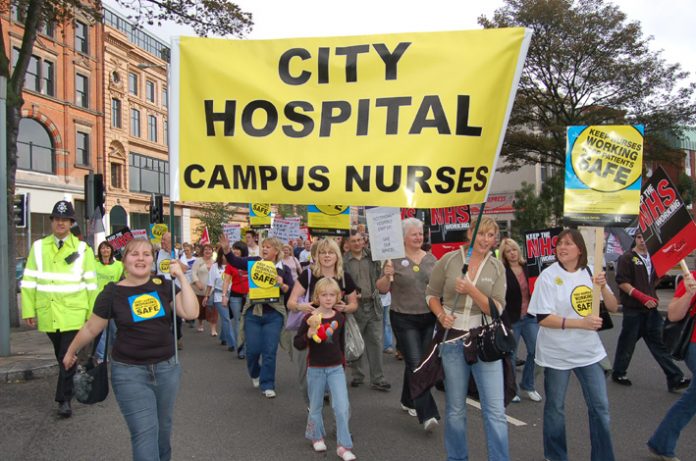Trade unions representing nurses, midwives and health workers covered by the ‘independent’ Pay Review Body (PRB), yesterday reacted angrily to a government-proposed huge ‘pay cut’.
Health workers ‘cannot be expected to “swallow” the 1.5 per cent increase proposed by the Department of Health (DoH) in its evidence to the PRB’, said UNISON and the Royal College of Nursing.
Even by Chancellor Brown’s 2.5 per cent official inflation figure, this is a one per cent pay cut, while the reality for workers is a much bigger cut.
Karen Jennings, UNISON Head of Health, said yesterday: ‘A 1.5 per cent pay increase works out at less than 2p an hour extra for newly qualified nurses and paramedics, with only pennies extra for experienced health workers.
‘It is also less than half the latest retail price index figure which stands at 3.6 per cent.
‘We are all paying more for basic necessities such as food, fuel and housing than this time last year, and health workers would be significantly worse off if they get a measly 1.5 per cent.’
Jennings added: ‘I don’t like the threatening tone of the DoH evidence. It is outrageous to suggest that unless staff take what is effectively a pay cut, jobs will go and patients will suffer.’
Josie Irwin, RCN Head of Employment Relations, said: ‘The government’s suggestion that nurses should only receive a 1.5 per cent pay increase next year is a slap in the face for the staff who have worked so hard under such intense pressure to deliver the government’s health reforms and improve patient care.
‘For the government to say more than 1.5 per cent would mean more job losses and redundancies is an outright threat.
‘You can’t deliver care without staff and ultimately, it’s about where the government chooses to spend public money. Based on this derisory offer, you have to question whether the NHS is the priority.’
The British Medical Association meanwhile, has warned that NHS hospitals will be put at a disadvantage, after the first advertisement by a large private hospital chain appeared.
From 2008 patients will be allowed to ‘choose’ either NHS treatment or private treatment paid for by the NHS.
Swedish company, Capio Healthcare, which operates thirty private hospitals and treatment centres in England, has placed advertisements in magazines aimed at GPs and other health professionals.
A BMA spokesperson said: ‘Government reforms mean that NHS providers are increasingly being forced to compete for patients against private firms with large marketing budgets and more expertise in “brand awareness”.
‘Inevitably, public money will be spent on advertising NHS services.’
Meanwhile, University Hospitals of Leicester NHS Trust bosses have warned that jobs may have to be cut and patient care at the city’s three hospitals may be affected, after being told they need to slash their budget by another £15m to prop up bankrupt primary care trusts.
This is on top of the £22m which was cut from the hospitals earlier this year.
Also, in the northwest, doctors at Countess of Chester Hospital have revealed it has been told by Western Cheshire Primary Care Trust (PCT) that it can’t cut waiting lists and treat patients sooner, even though it is able to.
Doctors say this is because the PCT is keen to get patients to go to the private Cheshire and Merseyside NHS Treatment Centre in Runcorn, with whom it has a block contract, and not to the hospital!
